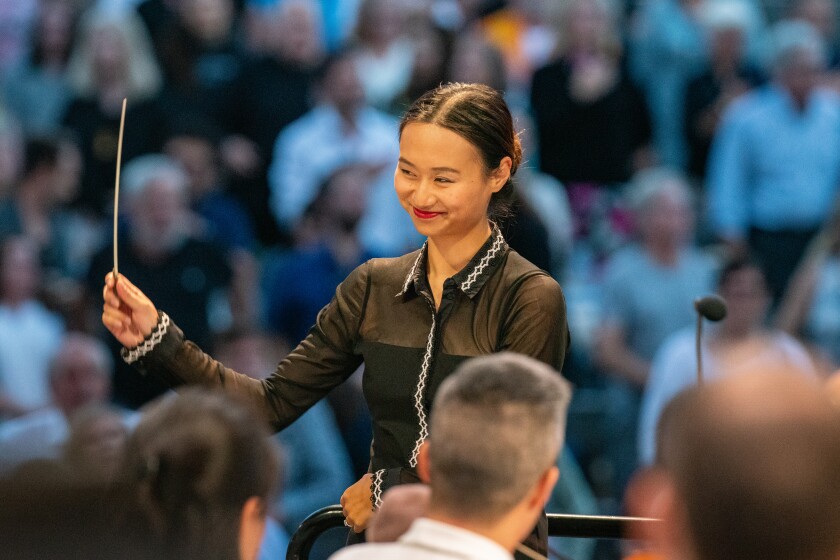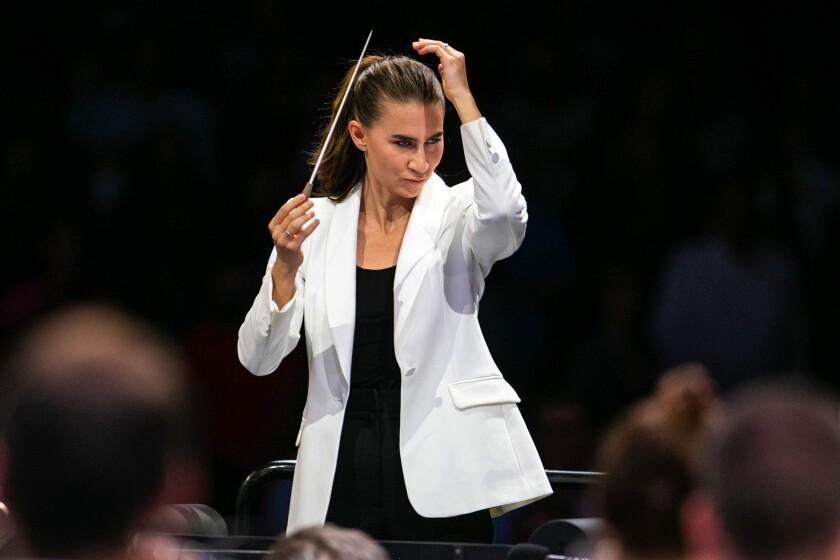Commentary: Did we just have the best Hollywood Bowl season ever?
When the Los Angeles Philharmonic opened its Hollywood Bowl season July 15, the mood was one of guarded optimism — cheer colored with denial. There were no requirements for vaccinations or masks. It was fine to bring the kids — and a good thing too. That memorable night, Gustavo Dudamel conducted a marvelous performance of “Peter and the Wolf,” with Viola Davis as the piquant narrator. Even so, people didn’t exactly picnic like it was 2019. Delta was on the march; the surge had begun.
Fast forward to Tuesday night, when Dudamel conducted an exceptional Mozart program for the L.A. Phil’s final Bowl concert of the season. Everyone had to show proof of vaccination or a recent negative COVID-19 test. Guarded optimism had turned into weary, what, me worry? acquiescence.
Through it all, this proved the most satisfying Bowl season in long memory. But it takes more than that to surmise whether we are likely to be back better. Will it be a case of what doesn’t kill you makes you stronger? Or will we, in trying to improve the world, make matters only worse?
The most relevant maxim at the moment, though, is absence makes the heart grow fonder. All that publicity-speak about sharing music with the masses, democracy at action, in the magical starlight and blah, blah, blah of the Bowl evaporated when the venue was treated as little more than Instagram picnic grounds.
Yet this summer, when the lights went down, communal attention was directed at the stage to a degree of focus I had never before witnessed at the Bowl. It was as if a bolt of lightning had struck and awakened all to the fact that music is what we had missed. Picnics hadn’t gone away, live music had. And best of all, the music was made by an L.A. Phil unwilling to take any note for granted during the summer.
Given the need for late planning and the uncertainty of travel, to say nothing of a nearly $100-million loss of projected revenue caused by the pandemic, the L.A. Phil stayed close to home. Dudamel stepped up to the Bowl plate and committed himself to five weeks. Six of the seven guest conductors were former Dudamel fellows, five of them excitedly making their Bowl debuts. The remaining guest conductor was also family: Thomas Wilkins, the Hollywood Bowl Orchestra’s music director, wore his well-fitting classical hat in an illuminating program that revolved around African American composers.

Tianyi Lu conducts the L.A. Philharmonic in her Hollywood Bowl debut July 20.
(Jason Armond / Los Angeles Times)
Changed though the mood was, nothing was an overnight affair. For instance, each summer lately has brought incremental improvements to the amplification system. This summer, it proved stunningly engaging, dominating the senses, letting no detail escape into the night air.
The not-so-secret ingredient was Dudamel. It was love at first downbeat when he made his U.S. debut in the Cahuenga Pass with the L.A. Phil in 2005; now, it is his personal playground. He jumps at the opportunity to work with pop and jazz artists (this summer, that included Christina Aguilera, H.E.R. and Carlos Vives) as well as to bring a parade of fresh ideas to symphonic programming.
Graying and at 40 well past his “Dude” days, Dudamel has become a magisterial, if still youthfully exuberant, music director who takes everything he conducts with great seriousness and great joy. He used his clout to get a respectable amount of rehearsal time (hardly a Bowl tradition), and he led exceptional-by-any-concert-hall-standards performances of Gershwin’s “An American in Paris,” Dvorák’s “New World” Symphony, Elgar’s “Enigma Variations,” Falla’s “The Three-Cornered Hat” and Tchaikovsky’s Fifth Symphony. On Tuesday, he ended the season with a commanding, incisive performance of Mozart’s Symphony No. 40 that, if released as a recording, would be competitive with the best of the hundreds out there.
Dudamel’s career-making debut, notwithstanding, a typical Bowl debut is so fraught that promise is more the exhilarating point than perfection. No matter that Enluis Montes Olivar struggled the most. He’s shown potential in the past and has been invited back as a Dudamel fellow. But any conductor who can immediately electrify the crowd and the orchestra alike clearly must have something. Tianyi Lu’s Technicolor “Pictures at an Exhibition” and Marta Gardolinska’s probing Beethoven Seventh made the names of these two young women well worth remembering.

Marta Gardolinska conducts the Los Angeles Philharmonic in her Hollywood Bowl debut on Sept. 9.
(Jason Armond / Los Angeles Times)
Yes, new talent and Dudamel conducting better than ever went beyond what top infectious disease specialists might have ordered for a revived post-pandemic Bowl. What better way to top this than with Dudamel leading an all-Mozart program?
Unexpectedly, that program also was a warning signal.
This time, with the amphitheater nearly full, picnicking around me did not cease once the concert began, despite Dudamel’s uncommon wit in his animated performance of Mozart’s early Symphony No. 25. Wine bottles dropped. Masks that had come off to eat and drink stayed off. Distracting phones created a great many points of unwanted light.
Even so, it was a terrific concert. The central piece, Mozart’s sublime Sinfonia Concertante, featured the orchestra’s concertmaster, Martin Chalifour, and principal violist, Teng Li, as fascinatingly dissimilar soloists. His usual cool, collected self, Chalifour added Mozartean decorations with impeccable elegance. Li was nearly the opposite with her full-bodied sound and highly expressive style. Gratifyingly, the soloists turned this into an unusually rich dialogue while also finding so much common ground in the first movement cadenza that some in the audience burst into spontaneous applause.
So the crowd (or enough of the crowd) did listen, did care. The cheers after each work got louder and more exuberant.
I’m not sure, though, that that is good enough. In his music, Mozart manifested a world of “new crowned hope,” and that could have been the motto of the Bowl this summer (had Peter Sellars not already used it once for a Mozart festival in Vienna). Must fall, as it did Tuesday, look different?
It won’t if we adopt a Mozartean pleasure principle that is substantive, not superficial. The divinely sensual slow movement of the Sinfonia Concertante is one of music’s great pleasures, but it can be savored, as the pandemic has surely taught us, only by paying attention. Decadence and decay are the alternative, which may be why Peter Greenaway used that Andante to mark the merry, casual drownings in his film “Drowning by Numbers.” Haven’t we had unimaginably too much of that already?
For all the latest Entertainment News Click Here
For the latest news and updates, follow us on Google News.
